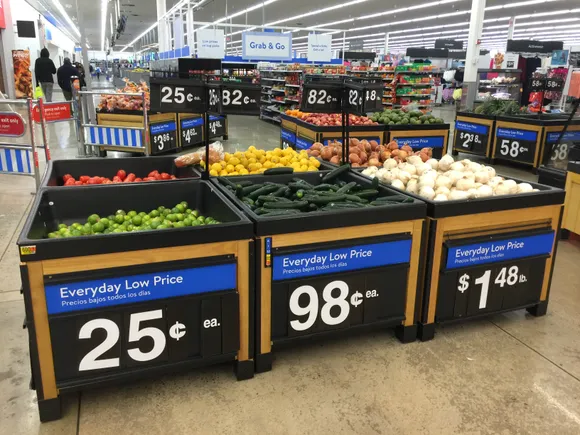Dive Brief:
- Organics recycling company Denali is partnering with Walmart to secure feedstock from more than 1,400 Walmart and Sam’s Club locations for the recycler’s depackaging facilities. The agreement is expected to boost Walmart’s recovered organics content by 60% and reduce its compactor trash volume by 12%, according to a release.
- Denali began rolling out its network of centralized depackaging processors in Phoenix, where it opened a facility in 2023. That location is capable of processing 15 tons of waste per hour, according to a city news release.
- The partnership with Walmart will initially serve stores in more than 16 markets — including Houston, Dallas, Philadelphia and Washington, D.C. Denali projects its depackaging network will be able to produce 500 million pounds of compost, fertilizer and animal feed annually derived from the waste.
Dive Insight:
While postconsumer food waste is often the subject of organics recycling initiatives at the state and local level, many large organics recyclers view preconsumer waste as as an attractive source of feedstock at scale. The ability to unlock those organic materials through depackaging has become crucial as composters and other existing processors struggle to prevent contamination in their facilities.
Grocers are increasingly partnering with companies like Denali to pilot technologies that can help address food waste. Otherwise competing food companies have formed partnerships like the U.S. Food Waste Pact and The Pacific Coast Food Waste Commitment to share best practices. Walmart, along with grocers like Aldi and Whole Foods, is a member of both groups. In April, the PCFWC released a report finding that participants were able to reduce wasted food tonnage by almost 25% in four years.
Walmart and Denali made their partnership public in 2023. The retailer has an internal goal to reduce its wasted food by 50% by 2030, in line with a broader commitment organized by the U.S. EPA for the country to reduce food waste per capita. Walmart reported it had reached a 12% reduction versus a 2016 baseline as of 2022, diverting more than 906 million pounds of food waste globally that year.
Denali’s depackaging solution can divert about 200,000 pounds of food waste from landfills per retail location, according to a release. It has historically partnered with a range of grocers, food manufacturers and other entities around the country, including through its Phoenix facility for the 2023 Super Bowl.
The company’s systems first mechanically shred or crush feedstock to separate organic food material from packaging made from a range of materials, including cardboard and plastic. They then feed the resulting sludge through a screening process to separate inorganic materials. The resulting biomass is processed in anaerobic digestors or composting facilities, where it can produce biogas and soil amendments, according to Denali’s website.
“Denali’s depackaging technology is revolutionizing the way in which food manufacturers, distributors, retailers — and the cities in which they operate — can reduce food waste,” Ilia Kostov, Denali’s chief revenue officer, said in a statement. “We are proud to work with the leading retailer – Walmart and Sam’s Club – to help reduce food waste at scale while simultaneously enabling the circular economy.”
Denali says its depackaging facilities can recover about 97% of organic material from a waste stream, including categories such as expired food, recalled items, food scraps and other dry and liquid goods.
Denali has previously reported it expects to have “at least 40” depackaging facilities online by the end of the year. It expects the rollout of its depackaging services network to continue through 2025.



